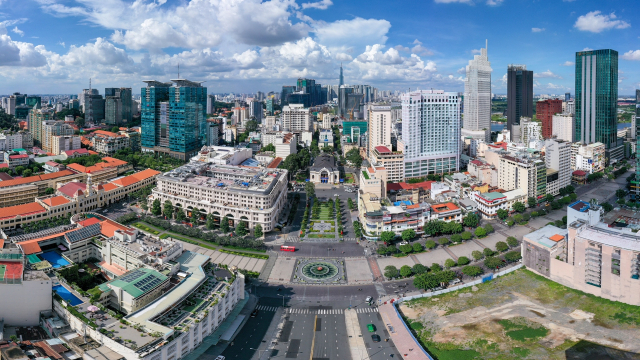Leader Talk
Six global trends shaping Vietnam’s future
Vietnam is recovering strongly with the economy is shifting from survival mode to growth mode. However, if Vietnam is to reach its full potential in the coming years, it will have to effectively navigate a number of global mega-trends that will shape its future, according to CEO of HSBC Vietnam Tim Evans.
The first trend is climate change. As a nation with an extensive coast line and with nearly 100 million people to feed and one of the world’s most important rice producers, the prospect of rising sea levels and falling crop yields as the world warms is a threat to its well-being and prosperity.
In addition, building a climate-friendly, low-carbon society and economy will need capital, innovation, and a global commitment to shared goals.
Although tackling climate change is a severe challenge that the country is facing, it is also a huge opportunity. Industries such as information technology, biomedicine, new materials, and new energy are emerging as the new, more sustainable drivers of economic growth.
The second trend is digital. The pandemic has accelerated the shift towards a seamless digital world and has triggered changes in consumers’ behaviour that are likely to have lasting effects.
The digital transformation will continue to drive the rapid integration of industry and technology, especially remote work, healthcare, education, entertainment and financial services while reducing transaction costs, facilitating participation in global value chains, and improving market access and reach.
.jpg)
One of the most powerful effects of the digital revolution is the way that it has levelled the global playing field, allowing countries like Vietnam to compete with more advanced economies. Companies like VNG, MoMo and VNPay – all unicorns founded in Vietnam – are world-class competitors, but if being to continue to build on their success, Vietnam need to continue to invest in education and accessibility to build a thriving digital ecosystem that drives innovation.
Within the context of digital transformation, protecting data security and privacy is critical, particularly as the metaverse continues to develop and grow. “We need to work regionally and globally on creating a unified data policy and approach,” he noted.
The third is vaccine equity. “Covid-19 is a reminder that we are all in this together. Unless every country and every community can obtain vaccines quickly and fairly, no one will be able to return to normal, and a truly global economic recovery will not be possible,” he emphasized.
It is essential to strengthen global cooperation in vaccine research and development, production, raw material supply, distribution, logistics, intellectual property exemptions, so as to help countries that struggle to compete with richer nations to obtain affordable vaccines and key medical supplies.
The next is trade. Covid-19 is continuing to cause disruptions to global supply chains, but trade still offers the shortest and most direct route back to economic growth.
These FTAs Vietnam has signed are expected to play a major role in boosting Vietnam’s economic growth this year.
However, challenges remain as the country will need to embark on further domestic reforms to ensure it can remain competitive. Vietnam will also need to continue to work with other Asian nations to facilitate cross-regional investment flows and dismantle non-tariff barriers if the region is to reach its full trade potential, Tim Evans said.
Other trend is geopolitics. The conflict in Ukraine and ongoing geopolitical tensions elsewhere will continue to inject unwelcome uncertainty into the global economy. Vietnam’s openness and principled stand on settling international disputes by peaceful means and in accordance with international law is a valuable voice in a confused international environment.
The last one is inequality and an inclusive recovery. It needs to urgently address and reverse the devastating impact of Covid-19 on poverty and inequality.
It is imperative that low-income developing countries are given the vaccines and support they need to recover. This is also an opportunity to build community resilience to minimise the impact of natural disasters and prevent future crises, including increasing investment in health and education, creating a fair and competitive labour market environment, and improving access to financial services and technology.
Vietnam’s growth headwinds prevail
Vietnam turns semiconductor vision into action
The global semiconductor industry is being reshaped by geopolitical tensions, shifting supply chains, and the surge of digital technologies.
Cutting red tape in APA approvals to speed up tax negotiations
The change in APA approval authority is expected to shorten processing time and enhance business proactiveness in international tax negotiations.
Enterprise cybersecurity is under threat from the inside
As hybrid cloud systems grow more complex, Vietnamese enterprises are struggling to detect cybersecurity threats moving laterally within their own networks.
Breakthrough for the international financial center ambition
The submission of the draft resolution on Vietnam’s international financial center to the National Assembly heralds a new developmental era for the country.
How leadership philosophy redefines hospitality in Nha Trang
More than just running a 5-star resort, Kristian Petersen is redefining the art of hospitality with a humane and sustainable leadership philosophy.
When organic becomes an inspiring wellbeing lifestyle
For Tyna Huynh, co-founder of Drinkizz, organic is not just a food choice but a way of life that fosters a deep connection between people, nature and community.










































